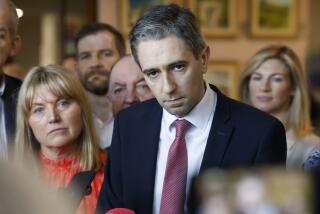Britain’s Labor Party chooses new leader
- Share via
Reporting from London —
Britain’s Labor Party chose the younger of two brothers as its new leader Saturday, selecting Ed Miliband over his older sibling to lead the party back from its electoral drubbing this spring after 13 years in power.
Miliband, 40, who served as secretary for energy and climate change in the government of former Prime Minister Gordon Brown, is the youngest leader in Labor Party history. After three other rivals were eliminated, he defeated his brother, David, the former foreign secretary who until recently was considered the favorite, by slightly more than one percentage point in balloting on the eve of the party’s annual conference.
As party leader, Miliband would lead Labor into elections and become prime minister should it win. But elections are probably several years away, and experts said Miliband has much work to do before then to bring Labor back.
In accepting the party leadership, Miliband praised Brown and his predecessor, Tony Blair, for improving the lives of millions of citizens during their years in office. But he acknowledged that the party was beaten badly in May elections that brought the Conservatives and the Liberal Democrats, Britain’s perennial third party, into office in a power-sharing deal.
“Today a new generation has taken charge of Labor, a new generation that understands the call of change,” Miliband said.
“I get it,” he said, referring to the many causes of Labor voters’ disaffection, including the financial crisis and dwindling purchasing power, growing unemployment, and parental anxiety about children’s education prospects.
“I get it also that whatever your view on the Iraq war, it led to an appalling loss of trust for us,” Miliband said. Blair brought his country into the Iraq conflict alongside the United States, but it proved to be hugely unpopular in Britain.
Miliband is regarded as being further to the left politically than his brother. His main support has come from trade union leaders and members, and core Labor voters. Unions have looked to him as they battle proposed cuts in public services spending and jobs under the present coalition government.
David Miliband was regarded as the more moderate candidate, whose more prominent role in the government and political experience appealed to white-collar workers and the higher-income banking and business world. He had appeared until the last days of the campaign to be a shoo-in.
Tony Travers, a political scientist at the London School of Economics, said both brothers have been extremely careful in recent weeks not to endorse strikes by the unions.
The brothers professed that the leadership contest did not damage their relationship, and Ed Miliband praised his 45-year-old brother for the “strength and eloquence” of his campaign for the party leadership.
The brothers come from strong leftwing roots, sons of Polish-born Jewish parents who fled mainland Europe in the Nazi era. Their father, Ralph Miliband, who died in 1994, fled Belgium on the last boat to England before German bombs fell. He became a Marxist academic and married Marion Kozak, now 76 and a lifelong Labor activist. She narrowly escaped Nazi persecution of Jews in Poland in the 1940s, finding refuge in England.
The siblings were educated in state-run schools in London, and then at Oxford University.
The other contenders for the party leadership were Ed Balls, a confidant of Brown; Andy Burnham, who served as health secretary under Brown; and Diane Abbott, who proposed herself as the first black woman candidate and made a strong appeal to grass-roots voters.
Travers said that the Conservative-led government is likely to welcome the election of the relatively untested Ed Miliband and that Labor has a long way to go.
“They will oppose the government on their budget cuts, but they have to come up with their alternative.” he said.
However, Miliband may grow into the job, he said, and prove a winner, as was the case with an unusual choice the Conservatives made 35 years ago: Margaret Thatcher.
Stobart is a news assistant in The Times’ London Bureau.
More to Read
Get the L.A. Times Politics newsletter
Deeply reported insights into legislation, politics and policy from Sacramento, Washington and beyond. In your inbox twice per week.
You may occasionally receive promotional content from the Los Angeles Times.










